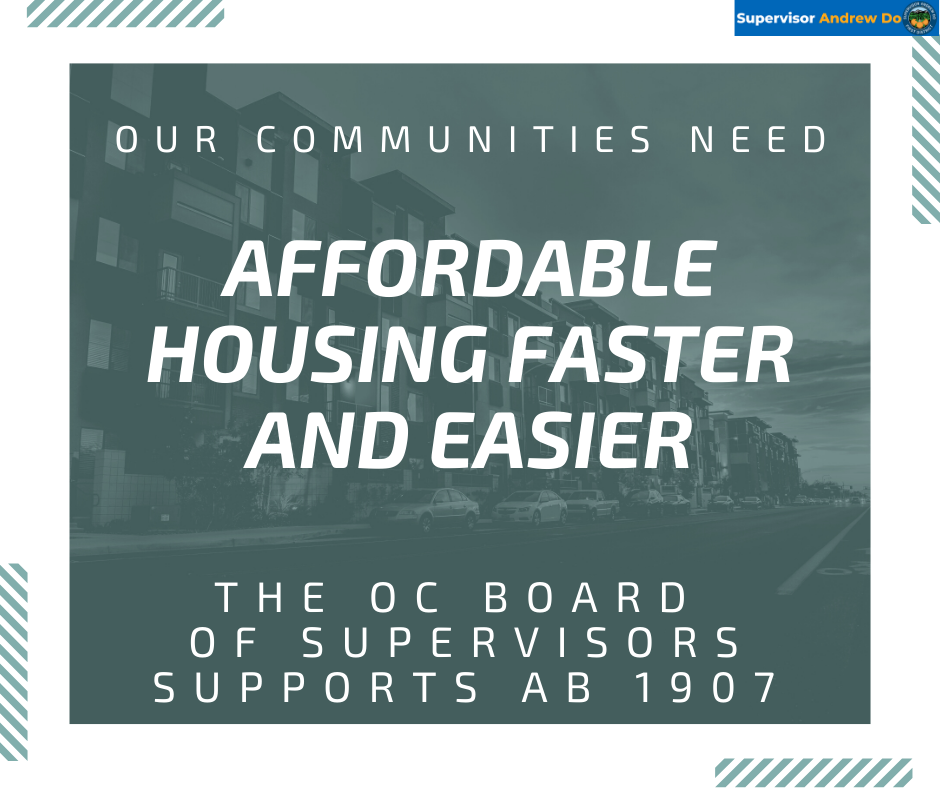
Orange County is backing a state proposal that would speed up affordable housing projects and bring much-needed relief to families struggling in one of the country’s most expensive housing markets.
“Young people and working families can’t afford to live in Orange County,” explains Supervisor Andrew Do, who serves as Vice Chairman of the Board of Supervisors. “We need to do everything we can to spur more affordable housing in Orange County.”
On Tuesday, Supervisor Do and his colleagues unanimously threw their support behind Assembly Bill 1907, which would exempt affordable housing, supportive housing, and emergency shelters from the California Environmental Quality Act, commonly known as CEQA.
“We’ve been urging Sacramento for years to deliver CEQA relief for affordable housing projects,” said Supervisor Do, “and, finally, they’re listening.”
Assembly Bill 1907: CEQA Relief for Affordable Housing
Assembly Bill 1907, authored by Assemblymembers Miguel Santiago (D-Los Angeles), Mike Gipson (D-Carson), and Sharon Quirk Silva (D-Fullerton), would expedite the construction of affordable housing, supportive homes, and emergency shelters by providing an exemption from CEQA, which adds significant costs, delays, and bureaucratic obstacles that impede affordable housing, especially in areas with a high cost of living such as Orange County.
Housing policy analysts say that CEQA, and its ensuing lawsuits, are especially harmful to affordable housing projects, which operate on razor-thin margins and cannot account for lengthy delays.
“CEQA is notorious for its abusive ‘greenmail’ lawsuits filed by those who oppose development projects for reasons that have nothing to do with the environment,” explains OC Register columnist Adam Summers, a research fellow at the Independent Institute. “A 2015 study by law firm Holland & Knight noted that only 13 percent of CEQA lawsuits in Southern California were filed by established environmental advocacy organizations.”
“AB 1907 is a measured and logical response to the growing homelessness and housing crisis across the state and should be supported by every person who truly understands the severity of this crisis,” said Laura Archuleta, CEO and President of Jamboree Housing. “I applaud the Board of Supervisors and the State Legislature for proactively working to ensure that housing for vulnerable populations can be built with fewer delays and obstructions.”
“The lack of housing construction itself has become the environmental problem that needs mitigation,” Milo Peinemann, CEO of American Family Housing, said. “This bill will support the Board of Supervisors in making rational choices to address the county’s own regional housing needs, by reducing the odds that locally supported housing developments will be stymied by lawsuits from opponents who often have no previous record of environmental advocacy.”
Orange County routinely ranks as one of the country’s most expensive housing markets. In December, Orange County’s median home price reached $732,750, the highest in Southern California, according to data from CoreLogic/DQ News data.
“I want to thank Assemblyman Miguel Santiago and his colleagues for introducing this important affordable housing legislation that will help Orange County families,” said Supervisor Do, a father of two college-age children.
Board Takes Action to Make Orange County More Affordable
Orange County is already investing tens of millions of dollars to increase affordable housing for low-income families and the homeless. Last June, as part of the annual budget, the Board of Supervisors approved Vice Chairman Do’s proposal to allocate $5 million toward the Orange County Finance Trust, a regional effort to fund affordable and supportive housing for the homeless.
In 2018, the Board of Supervisors designated $70.5 million of Mental Health Services Act funds to permanent supportive housing. The cumbersome and costly environmental process is a contributing factor to the significant delay in applications by local affordable housing developers to make use of those funds.







